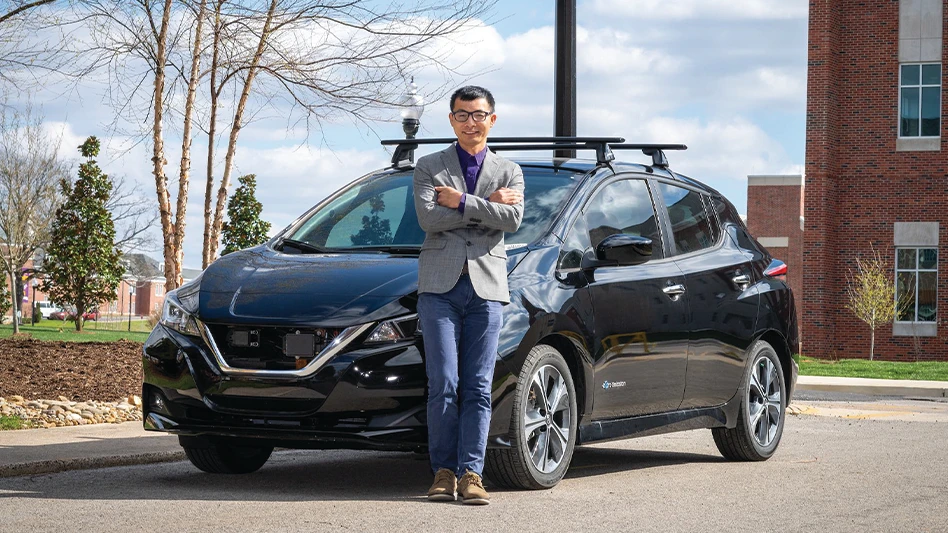
Photo courtesy of Tennessee Tech University
Researchers at Tennessee Tech University have been selected to receive $4.8 million in grant funds from the U.S. Department of Energy (DOE) to help improve the nation’s electric vehicle (EV) battery recycling ecosystem.
The effort is part of a $45 million federal initiative supporting projects at eight businesses or institutions, including General Motors, Caterpillar Inc. and Siemens Corp. Tennessee Tech is the only grant recipient based in the southeastern U.S.
The university says Pingen Chen, associate professor of mechanical engineering, will serve as the project lead. The school says Chen is a longtime advocate for EV technology and has been awarded millions in previous federal grants to help spur EV adoption and proliferate EV charging stations in rural communities. Last year, Chen helped bring a fully electric shuttle vehicle to the school’s Cookeville campus.
“We hear concerns in rural communities when people are considering an electric vehicle—what do we do with the battery when the vehicle is retired?” Chen says. “Our goal is to figure out the most efficient, cost-effective and safest way to recycle these batteries at the end of their life cycle.”
The university says EV battery recycling can be a complex process. Its project aims to make the system more seamless and user-friendly by developing a mobile processing hub that can be taken to local collection sites, allowing EV owners to have batteries safely disassembled and shredded onsite. The batteries’ raw materials will then be extracted, studied and reused in battery manufacturing, creating a circular economy that protects scarce minerals and supports the sustainability of the EV industry.
The university says the grant marks the continuation of a years-long focus for Chen, whose belief in the potential of EV technology was informed by his own upbringing.
“I grew up in a rural, low-income community and I know electric vehicles can help people in those settings reduce their transportation costs,” Chen says. “In Tennessee, for example, where we have very affordable electricity rates, an electric vehicle can actually save you over 50 to 60 percent on transportation costs.”
Other Tech faculty joining Chen on the project include Stephen Canfield, professor of mechanical engineering; Nan Chen, assistant professor of electrical and computer engineering; Jiahong Zhu, professor of mechanical engineering; Daniel Yoon, assistant professor of mechanical engineering; and Michael Aikens, assistant vice president for economic development and director of Tech’s Center for Rural Innovation.
The university says Canfield’s involvement in this project will focus on leveraging collaborative robotics to help execute the mobile reprocessing hub. Students in his robotics class will get the chance to participate in the effort as part of the school’s longstanding commitment to expanding undergraduate students’ research opportunities.
The grant is not the first the university has received for EV adoption. The department previously awarded Chen and his colleagues a separate $1 million grant to continue work on expanding EV charging availability and helping city agencies—including those in Chattanooga and Nashville—integrate more EVs into their fleets.
“Our mission is to serve the state of Tennessee,” Canfield says. “We have so many engineering students that come through and do that. These research projects allow us to solve large problems and educate our students at the same time. It’s exciting because we’re growing our students, we’re growing our research and we’re integrating the two to serve our state and solve real problems. I think that’s what makes Tennessee Tech so wonderful.”
Get curated news on YOUR industry.
Enter your email to receive our newsletters.
Latest from Recycling Today
- Fresh Perspective: Raj Bagaria
- Saica announces plans for second US site
- Update: Novelis produces first aluminum coil made fully from recycled end-of-life automotive scrap
- Aimplas doubles online course offerings
- Radius to be acquired by Toyota subsidiary
- Algoma EAF to start in April
- Erema sees strong demand for high-volume PET systems
- Eastman Tritan product used in cosmetics packaging






